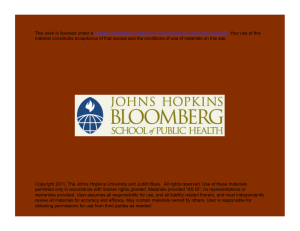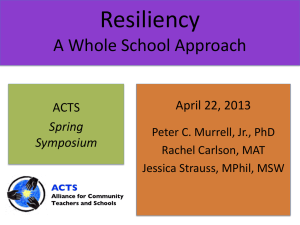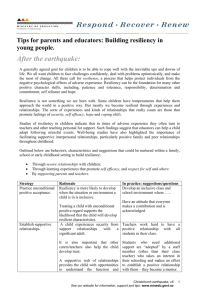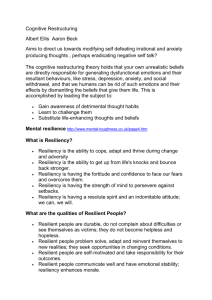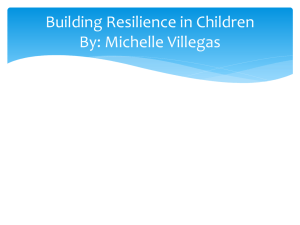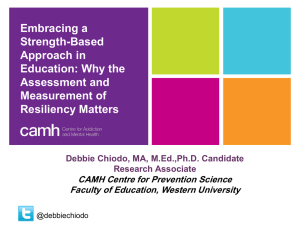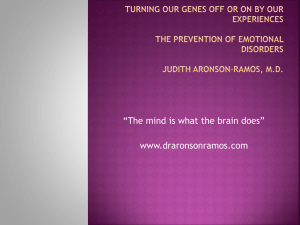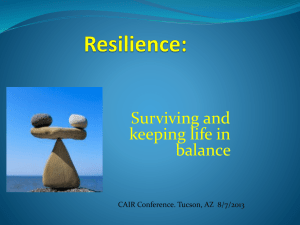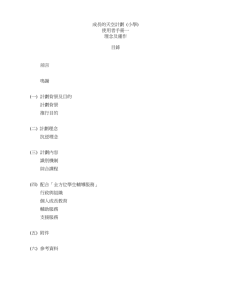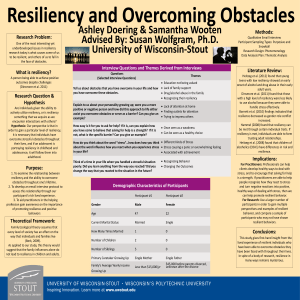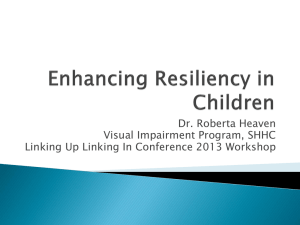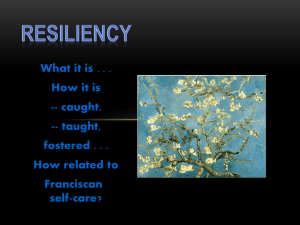PPT - Young Survival Coalition
advertisement
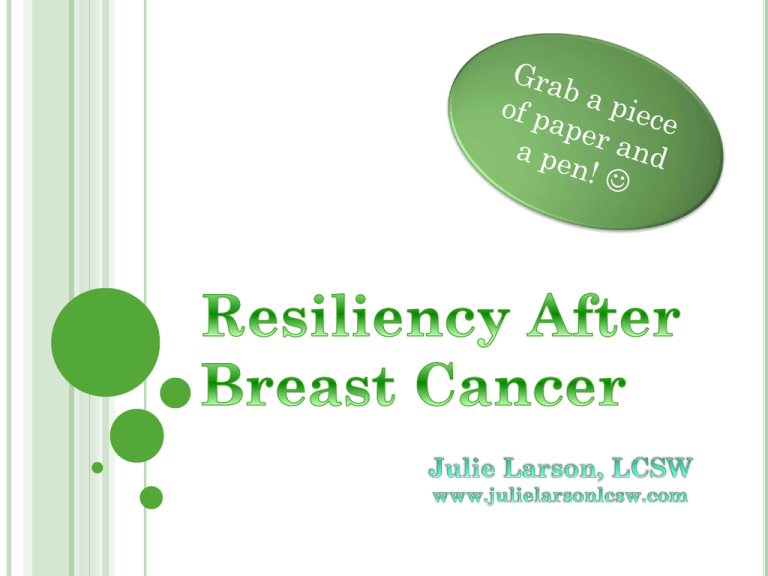
NOUN 1. The ability to return to the original form, position, etc… after being bent, compressed or stretched. 2. Ability to recover readily from illness, depression, adversity or the like; buoyancy. WHAT IS RESILIENCE? MYTH: Resilience is a genetic trait. You either have it or you don’t. We are all born with innate resiliency. An inborn capacity for “self-righting”. Resilience is found in a variety of thought processes and behaviors that can be learned throughout a lifetime. Resilience develops as people grow and develop better thinking, self-management skills and knowledge. WHEN ACTIVE TREATMENT ENDS When others are ready to celebrate the end of your treatment, cancer survivors often experience a mix of emotions/reactions after treatment ends. THE POSITIVE FEELINGS: Acknowledging personal strengths Deepened relationships with loved ones Excited about the future New desire to set personal goals A sense of gratitude and appreciation for life …. RESILIENCE! WHEN ACTIVE TREATMENT ENDS THE “Not-so-Positive” FEELINGS Fear of Recurrence: Worry about future unknowns Anxiety: Concern about not being in active treatment Concerns about physical appearance Sadness Depression Grief Anger about having had the life disruption of cancer Financial concerns Guilt or Regret Emotional numbness Spiritual uncertainty Learning new ways to care for yourself PERSONAL GROWTH – RESILIENCY! Most people who experience a major life crisis or event experience feelings of grief, anxiety, anger, and other negative emotions. Growth comes not from the avoidance of these negative emotions but rather from the struggle to cope with them. Positive Feelings Gain confidence Frame of mind to explore the world Find meaning, fulfillment and satisfaction Build skills & internal resources (manifestation of Resilience) SO WHO HERE IS RESILIENT? Of course you are! But…What is your personal “brand” of resiliency? Can you articulate how you’ve made it this far? What habits or qualities would you like to cultivate within yourself as you move forward in your survivorship? YOUR “PERSONAL BRAND” OF RESILIENCE Make a list of different ways you care for yourself Consider your five senses How do you care for yourself at: Work? Home? When you are out socially? In the middle of the night? If being with people is part of your list, what are you doing together? GETTING TO KNOW YOU… The “YOU INVENTORY” The best parts of being me! What underlying qualities would you want others to know about you? Did you learn anything new about yourself since you were diagnosed with cancer? How are these qualities important in your relationships with others? What one, two or three things can I do better than everyone else in this room? COMMON TRAITS OF RESILIENT PEOPLE: Social Competence: Responsive Flexible Empathetic Caring Communicative Sense of humor Problem Solvers: Planning Help-seeking Critical thinkers Creative. Benard, B. (1991). Fostering Resiliency in Kids: Protective Factors in the Family, School, and Community. Portland, OR: Western Center for Drug-Free Schools and Communities. COMMON TRAITS OF RESILIENT PEOPLE Autonomous: Strong sense of identity Self-aware Task mastery oriented Adaptive Able to set boundaries from negative messages/conditions. Sense of Purpose & Belief in the future: Goal oriented Educational aspirations Optimism Faith Spiritual connectedness Benard, B. (1991). Fostering Resiliency in Kids: Protective Factors in the Family, School, and Community. Portland, OR: Western Center for DrugFree Schools and Communities. PERSONAL RESILIENCY BUILDERS Relationships Service Humor Inner Direction Perceptiveness Independence Positive View of Personal Future Henderson, N. (2003). Hard-wired to bounce back. Prevention Researcher (10), 1, 5 – 7. PERSONAL RESILIENCY BUILDERS Flexibility Love of Learning Self-motivation Competence Self-Worth Spirituality Perseverance Creativity Henderson, N. (2003). Hard-wired to bounce back. Prevention Researcher (10), 1, 5 – 7. ACTIVITY: ROLE MODEL SEARCH! Who are the people you admire? (or who inspire you, are enjoyable and feel “good to you”) You might have different role models for different aspects of your identity. You may know these folks: family members, friends, colleagues, people in your larger community Role models can also be people you don’t personally know (or characters who aren’t even real!) Bottom line: What are the qualities or characteristics about this person that you like? It is highly likely that those qualities or characteristics are traits you’d want to embody as well. So… give it a go! WHY DOES RESILIENCY MATTER? Resilient people often find meaning even in times of trouble and gain confidence from overcoming adversity. In this way, resilience can contribute to a deeply satisfying life. Resiliency and Happiness are closely linked Happiness involves feeling more positive emotions than negative emotions. Positive emotions help us build skills and internal resources…a larger repertoire of assets that we can draw on in stressful times. In other words, “Happy people become more satisfied not simply because they feel better, but because they develop resources for living well.” Bauer & Bonanno THE UPWARD SPIRAL OF WELLBEING Positive Feelings Gain confidence Find meaning, fulfillment and satisfaction Frame of mind to explore the world Build skills & internal resources (manifestation of Resilience) REACTING TO STRESS Stress, itself is not the solitary issue. Its how we react to the circumstances and events in our life that can be healthy or “not so healthy”. Distressed Strong Tired Character Building Sick Growth Overwhelmed Reward Emotional Fulfillment AFFIRMATIONS Affirmations are healing, positive messages you give to yourself to counter your negative self-talk. Three Types of Affirmations: “I am…” (A statement about you) “I can…” (A statement of your potential) “I will…” (A statement of change in your life) “The real tragedy of life is not that each of us doesn’t have enough strengths, its that we fail to use the ones we have” – Gallop Organization CULTIVATING RESILIENCY Be mindfully present Celebrate everyday successes Play to your strengths (that list we just made!) Nurture gratitude Emmons & McCollough, 2005 Lyubomirsky, 2005 Random acts of kindness … Glorified Make it Real… Honest. Mystical Real.
